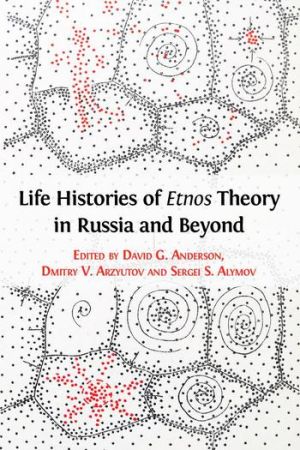Life Histories of Etnos Theory in Russia and Beyond
by David G. Anderson, Dmitry V. Arzyutov, Sergei S. Alymov
DescriptionTable of ContentsDetailsHashtagsReport an issue
Life Histories of Etnos Theory in Russia and Beyond makes a powerful argument for reconsidering the importance of etnos in our understanding of ethnicity and national identity across Eurasia. The collection brings to life a rich archive of previously unpublished letters, fieldnotes, and photographic collections of the theory's early proponents. Using contemporary fieldwork and case studies, the volume shows how the ideas of these ethnographers continue to impact and shape identities in various regional theatres from Ukraine to the Russian North to the Manchurian steppes of what is now China. Through writing a life history of these collectivist concepts, the contributors to this volume unveil a world where the assumptions of liberal individualism do not hold. In doing so, they demonstrate how notions of belonging are not fleeting but persistent, multi-generational, and bio-social.
This collection is essential reading for anyone interested in Russian and Chinese area studies. It will also appeal to historians and students of anthropology and ethnography more generally. 






Book Description
The idea of etnos came into being over a hundred years ago as a way of understanding the collective identities of people with a common language and shared traditions. In the twentieth century, the concept came to be associated with Soviet state-building, and it fell sharply out of favour. Yet outside the academy, etnos-style arguments not only persist, but are a vibrant part of regional anthropological traditions.Life Histories of Etnos Theory in Russia and Beyond makes a powerful argument for reconsidering the importance of etnos in our understanding of ethnicity and national identity across Eurasia. The collection brings to life a rich archive of previously unpublished letters, fieldnotes, and photographic collections of the theory's early proponents. Using contemporary fieldwork and case studies, the volume shows how the ideas of these ethnographers continue to impact and shape identities in various regional theatres from Ukraine to the Russian North to the Manchurian steppes of what is now China. Through writing a life history of these collectivist concepts, the contributors to this volume unveil a world where the assumptions of liberal individualism do not hold. In doing so, they demonstrate how notions of belonging are not fleeting but persistent, multi-generational, and bio-social.
This collection is essential reading for anyone interested in Russian and Chinese area studies. It will also appeal to historians and students of anthropology and ethnography more generally.
This open book is licensed under a Creative Commons License (CC BY). You can download Life Histories of Etnos Theory in Russia and Beyond ebook for free in PDF format (50.1 MB).
Table of Contents
Chapter 1
Grounding Etnos Theory: An Introduction
Chapter 2
Etnos Thinking in the Long Twentieth Century
Chapter 3
Ukrainian Roots of the Theory of Etnos
Chapter 4
Mapping Etnos: The Geographic Imagination of Fёdor Volkov and his Students
Chapter 5
Notes from His "Snail's Shell": Shirokogoroff's Fieldwork and the Groundwork for Etnos Thinking
Chapter 6
Order out of Chaos: Anthropology and Politics of Sergei M. Shirokogoroff
Chapter 7
Chasing Shadows: Sharing Photographs from Former Northwest Manchuria
Chapter 8
"The Sea is Our Field": Pomor Identity in Russian Ethnography
Chapter 9
Epilogue: Why Etnos (Still) Matters
Book Details
Title
Life Histories of Etnos Theory in Russia and Beyond
Subject
Sociology and Social Sciences
Publisher
Open Book Publishers
Published
2019
Pages
450
Edition
1
Language
English
ISBN13
9781783745449
ISBN10
1783745444
ISBN13 Digital
9781783745463
ISBN10 Digital
1783745460
PDF Size
50.1 MB
License

Related Books

This open book adopts a rights-based approach to shed light on the different legal and policy instruments that have been developed to implement circular migration policies in the EU, and their consequences for the rights of migrant workers. It contributes to the understanding of the meaning of this concept in general and in the EU, as well as speci...

Lifestyle in Siberia and the Russian North breaks new ground by exploring the concept of lifestyle from a distinctly anthropological perspective. Showcasing the collective work of ten experienced scholars in the field, the book goes beyond concepts of tradition that have often been the focus of previous research, to explain how political, economic ...

Ability to use information and communication technologies (ICT) is an imperative for effective participation in today's digital age. Schools worldwide are responding to the need to provide young people with that ability. But how effective are they in this regard? The IEA International Computer and Information Literacy Study (ICILS) responded t...

This book summarizes the key findings from the second cycle of IEA's International Computer and Information Literacy Study (ICILS), conducted in 2018. ICILS seeks to establish how well schools around the globe are responding to the need to provide young people with the necessary digital participatory competencies. Effective use of information ...

This two-volume book, published open access, brings together leading scholars of constitutional law from twenty-nine European countries to revisit the role of national constitutions at a time when decision-making has increasingly shifted to the European and transnational level. It offers important insights into three areas. First, it explores how c...

This book examines the evolution of the relationship between taxpayers and their states in Sweden, Italy, the United Kingdom, the United States, and Romania, and asks why tax compliance is so much higher in some countries than others. The book shows that successful states have built strong administrative capacities, tax citizens fairly and equitabl...

